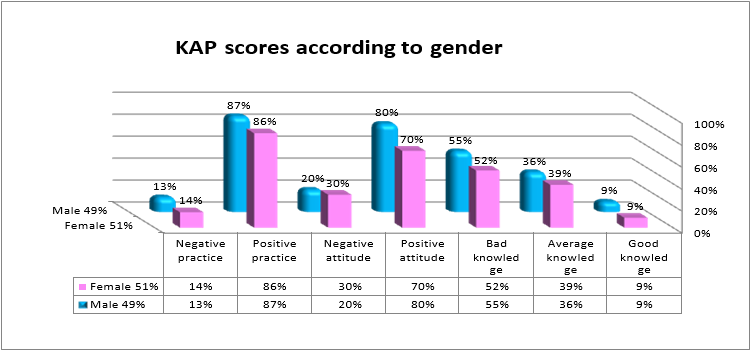Knowledge, Attitude and Practice of Diabetes in the Province of Kirkuk-IRAQ
Main Article Content
Abstract
Background: Diabetes is a chronic disease with high morbidity, increased susceptibility to other diseases, such as cardiovascular disease and premature death. The disease has two types, 1 and 2. Type1 has genetic predisposition factors leading to the immune system attacking and destroying pancreatic beta cells. The exact etiology of type 2 is unclear but environmental and lifestyle factors play a major role in susceptibility. According to government estimates, Iraq had 668,000 affected individuals in 2000. Recent estimates predict that by 2030, Iraq will have more than 2million of its population afflicted by diabetes. There is, therefore, an unmet need to explore how the healthcare system in Iraq currently manages and it is prepared to deal with diabetes at such a huge health problem.
Methods: This study was designed to examine awareness, attitude and the practice of healthy lifestyles to prevent and/or deal with diabetes in the province of Kirkuk-Iraq. A cross-sectional study was carried out to collect data from the general population through a random-sampling approach. We collected data from a cohort of 300 individuals. The data recorded through face-to-face interviewing and the completion of questionnaires.
Results: The study revealed that there is generally a poor knowledge of the disease in the population. About 36% of the cohort who were interviewed had no or little knowledge of the disease, its causes and management. 56% of those interviewed, however, were happy to abide by advice given to them by medical professionals to reduce the likelihood of them getting the disease. Knowledge of, attitude to and practical approach to deal with the disease varied according to age, educational standards but had no relations to gender or body mass index (BMI). Somewhat expectedly, knowledge of proper lifestyles including choice of diet was higher in those who had diabetes compared with non-diabetics.
Conclusion: Overall, appears to be a general lack of adequate knowledge in the cohort investigated about diabetes, susceptibility factors and impact on the wellbeing and long-term health. The study provides important data on attitude and approach to this disease in this microcosm of the population of the Kirkuk province in Iraq. In addition, provide an outline of actions that will be required to reduce or limit the impact rampant disease could have on the health, wellbeing and even the wealth of the population of Iraq by the end of this decade
Article Details
References
Mansour AA, Wanoose HL: Insulin crisis in Iraq. The Lancet 2007, 369:186
World Health Organization, World directory of medical schools-7th edition. Geneva 2000. (http://www.who.org)
Priyanka RCK, Angadi MM. Hospital-based KAP study on diabetes in Bijapur, Karnataka. Indian Journal of Medical Specialties 2010;1(2):80-83.
Z. Saadia, S. Rushdi, M. Alsheha, H. Saeed, M. Rajab: A study of Knowledge Attitude and Practices of Saudi women towards Diabetes Mellitus. A (KAP) study in Al-Qassim region. The Internet Journal of Health 2010;11(2).(http://www.ispub.com/journal/the-internet-journal-of- health/volume-11-number-2/a-study-of-knowledge-attitude-and-practices-of-saudi-women-towards- diabetes-mellitus-a-kap-study-in-al-qassim-region.html)
Fatma Al-Maskari, Mohamed El-Sadiq, Juma M. Al-Kaabi, Bachar Afandi, Nicolas Nagelkerke, and Karin B. Yeatts. Knowledge,attitude and practice of diabetic patients in the UAE, DOI: 10.1371/journal.pone.0052857.
Soheil Fatehiboroujeni, Ala Qattawi, Sachin Goyal. (2020). Understanding Gaps in Student Engagement and Motivation in Online and Hybrid Mechanical Engineering Courses. Journal of Online Engineering Education, 11(1), 01–08. Retrieved from http://onlineengineeringeducation.com/index.php/joee/article/view/36
Paterson M A,Smart CE,Lopez PE, et al influence of dietary protein on postprandial blood sugar level in individuals with type 1 DM using insulin therapy Diabet Med 2016;33:592-598
JN Harvey,VL, Lawson .The importance of health belief models in determining self-care behavior in diabetes , Diabetic Medicine 26 (1),5-13,2009
Kirsten Patrick, Maryam Kebbe ,Diane Aubin .A home for patient-oriented research CMAJ May 22,2018 190(20) E607;DO1
Young LA, Buse JB, Weaver MA, et al ; Monitor Trial Group.Glucose self monitoring in non- Insulin treated patients with type 2 diabetes in primary care setting: a randomized tri al. JAMA Intern Med 2017;177:920-929. Ambigapathy R, Ambigapathy
Alain Miguel Domínguez Acosta, Carlos Lázaro Ceruto Cruz, Víctor Manuel Malagón Hernández. (2022). Live Weight Estimation in Pelibuey Sheep Breeders using Digital Image Analysis. Revista Electronica De Veterinaria, 68 - 71. Retrieved from https://www.veterinaria.org/index.php/REDVET/article/view/141
S, Ling HM. A knowledge, attitude and practice (KAP) study of diabetes mellitus among patients attending Klinik Kesihatan Seri Manjung. NCD Malaysia 2003; 2:6-16.

